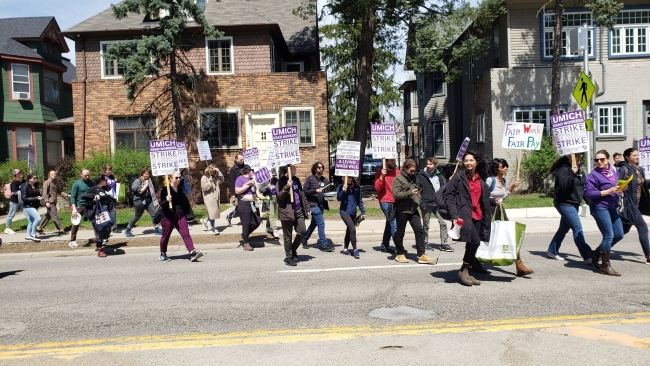You have /5 articles left.
Sign up for a free account or log in.

The University of Michigan graduate student workers’ strike began March 29.
Graduate Employees’ Organization
The graduate student workers’ strike at the University of Michigan at Ann Arbor is nearing its one-month mark and the end of the spring semester—impacting grading in the last week of final exams.
“We see this as a big point of our leverage,” said Amir Fleischmann, a Ph.D. candidate and a graduate student instructor who chairs the graduate workers’ union contract committee.
The Graduate Employees’ Organization (GEO), affiliated with the American Federation of Teachers, represents the striking graduate student instructors and staff assistants. They’re seeking, among several other demands, to raise their minimum annual salaries from $24,000 to about $38,500.
“The university needs to put in those grades, and we do not think they’re going to be able to do it without us,” Fleischmann said.
The major undergraduate student graduation ceremonies are Saturday, university spokesman Rick Fitzgerald said.
“We’ve made it clear to the students this year that even if there are even further delays for some reason in grades, it won’t affect their ability to participate in commencement,” he said. “You know, this is not anything that’s within their control.”
Fleischmann said GEO isn’t planning to disrupt graduation.
Strikers recently surrounded university president Santa J. Ono’s SUV after finding him at a restaurant, and campus police briefly arrested strikers there. Ono, who is also a cellist, canceled an on-campus performance with the Ann Arbor Symphony Orchestra over the weekend, over concerns about protests.
“If President Ono wants to go be able to do fun things like play the cello in the symphony, he should do the right thing and pay us a fair wage,” Fleischmann said.
Faculty members are objecting to how the university is trying to finish up grading.
The faculty’s Senate Advisory Committee on University Affairs released a statement Friday saying that Timothy McKay, the College of Literature, Science and the Arts undergraduate education associate dean, “indicates that the administration is expecting and ordering chairs to appoint ‘alternate faculty’ to calculate and enter grades in classes where the GSIs are the sole instructors of record, and is asking chairs to report faculty who do not comply with this directive.”
The committee, the executive arm of the university’s Faculty Senate, urged “faculty to reject requests to grade students they have not taught.”
“A directive to outsource grading demands that we faculty engage in a pedagogical assessment of students we have not taught and do not know, which is a violation of professional ethics,” the statement reads. “Bypassing faculty-of-record and hiring third party graders is an infringement on faculty freedom.”
On Monday, history department faculty members sent their own statement to university administrators, taking things further.
“We are deeply troubled by reports that the administration intends to punish faculty, staff, and department chairs who refuse to assign grades for work that they have not personally assessed,” that statement says. “We find these actions to be an infringement on faculty autonomy, and we reject the threats and warnings of the administration as unethical and antithetical to our mission as educators.”
The history faculty members’ statement added, “In light of the administration’s pressure to implicate faculty in breaking GEO’s strike and to perform uncompensated labor, history department faculty have made a collective decision to withhold our grades as a form of protest until May 12. On that day, we will collectively reconsider our stance.”
Fitzgerald said the College of Literature, Science and the Arts, of which the history department is part, is the university’s largest school for undergraduates.
“Exactly how to accomplish the grading for individual faculty situations is really up to the deans in the schools and colleges,” he said. But he said the college’s approach is backed by the provost.
“We’re trying to solve a problem for our undergraduate students so that they aren’t harmed,” Fitzgerald said.
Fleischmann, though, said he thinks pressure on the university will increase when students start complaining about their grades.
“These grades that the students are getting at the University of Michigan are bullshit grades, and the university administration is really sacrificing instructional quality for just getting something in,” he said.
John Carson, a tenured associate professor of history, roughly estimated that about 70 percent of the history faculty was at the Monday meeting that produced that statement. He said there was no vote on it and, if there were, “it wouldn’t have been unanimous.”
“But it seemed to be broadly shared amongst a large number of the faculty there,” Carson said.
“Someone would be grading students who had conceivably never seen them, had never had them in class, would really have no way to assess them,” he said. He said the “well-off” university should try to meet the union’s compensation request.
“It should be modeling the best values in the culture,” he said, rather than looking to get “the most out of people with the least amount of pay, basically.”
On Tuesday, Laurie McCauley, the university’s provost and executive vice president for academic affairs, emailed faculty members, stressing grading punctuality.
“As the end of the academic year approaches, I am writing to confirm the importance of timely reporting of course grades for the sake of all our students, who would be deeply affected by the failure to assign grades,” she wrote. “The on-time submission of grades impacts our students’ eligibility for financial aid, student loans, continuing enrollment, degree completion, graduation and job qualification. Grades are reviewed on May 2 by the Registrar’s Office for matters of academic standing and on May 4 by the Financial Aid office to confirm academic progress.”
The university has argued that the graduate student workers are part-time employees, and it’s opposing going to $38,500 minimum for all of them. Fitzgerald said the union needs to move on its compensation demand “before we’re willing to make another move.”








